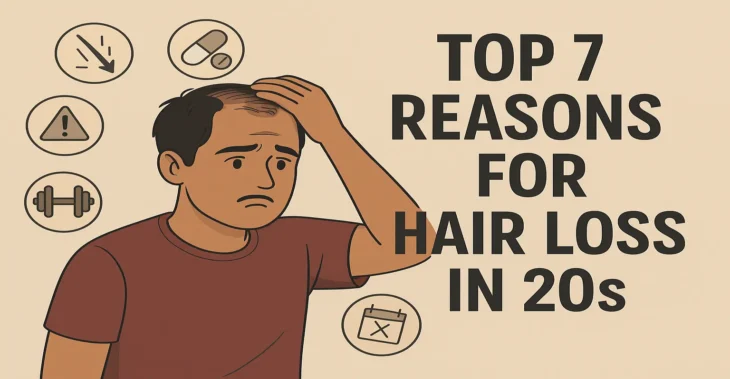
Top 7 Reasons for Hair Loss in 20s
There is nothing more unsettling than noticing hair fall – especially when you are still in your 20s. As a trichologist, I often meet clients in their early 20s who are shocked to find their hair thinning or shedding far more than expected. The truth is, hair loss in your 20s is becoming increasingly common, and the reasons behind it can vary widely.
Let’s break down the top 7 reasons for hair loss in your 20s, in simple terms – no scary science talk, just real causes and practical solutions.
1. Stress (Yes, Your Mind Affects Your Mane)
Whether it’s the pressure of college, a new job, or personal challenges, stress is one of the biggest hidden culprits behind losing hair at 20. When your body is under mental or physical stress, it can trigger a condition called telogen effluvium – a fancy term for when your hair prematurely shifts from growing to shedding.
What to do – Practice mindfulness, exercise regularly, sleep well, and don’t hesitate to talk to someone if you are feeling overwhelmed. Reducing stress is not just good for your mind – it is a key to healthy hair too.
2. Poor Nutrition (Your Hair Needs Food Too)
Eating too many processed foods or skipping meals can leave your hair undernourished. Iron, protein, Vitamin D, and B12 are essential for hair health. A lack of these can cause your strands to weaken and fall out.
What to do – Include eggs, leafy greens, nuts, fish, and fruits in your meals. A simple blood test can help identify deficiencies. Supplements should only be taken under guidance.
3. Hormonal Imbalance (Not Just a Female Thing)
Hormones affect everything from your mood to your hairline. Conditions like PCOS in women or even excessive testosterone conversion in men can lead to noticeable hair loss. These hormonal shifts often show up in your 20s.
What to do – If you are noticing acne, weight fluctuations, or irregular periods (for women), it might be worth checking your hormone levels. Consulting a doctor early can prevent long-term hair loss.
4. Genetics (Turns out, your DNA might have a say)
If your parents or grandparents had hair loss in their 20s, chances are it might run in the family. Male or female pattern baldness can start early for some people. It usually appears gradually – like a widening part or thinning at the crown.
What to do – While you can’t change your genes, early intervention helps. Topical treatments like minoxidil or low-level laser therapy, when started early, can slow or stop progression.
5. Over-styling & Heat Damage (Your Hair Needs a Break)
Flat irons, tight ponytails, harsh dyes, and frequent heat styling can cause traction alopecia or hair breakage. Many people don’t realize their styling habits are making them lose more hair over time.
What to do – Give your hair some downtime. Switch to gentler hairstyles, use heat protectant sprays, and avoid chemical treatments too often.
6. Crash Dieting or Sudden Weight Loss
Your hair is one of the first parts of your body to react to a sudden shift in your health. Drastic diets, especially those low in protein and healthy fats, can disrupt the hair growth cycle.
What to do – Avoid extreme diets. A slow, steady, and healthy approach to weight loss ensures your body – and your hair – are not deprived of essential nutrients.
7. Scalp Issues (The Foundation Matters)
Dandruff, fungal infections, or an overly oily scalp can block hair follicles and weaken the hair shaft, leading to shedding. Many ignore scalp health while focusing only on shampoos or serums.
What to do – Choose a gentle, scalp-friendly shampoo and maintain good hygiene. If itching or flaking persists, see a dermatologist or trichologist for a proper scalp evaluation.
Losing Hair at 20? You are Not Alone – But You Can Take Control
If you are dealing with hair loss in your 20s, it can feel alarming, especially when you thought this problem was decades away. But the good news is – most of these issues are treatable or manageable, especially when caught early.
Keep in mind, losing hair at 20 doesn’t make you any less beautiful or confident. Hair loss is a signal from your body that something may be out of balance – and paying attention now can save you a lot of heartache (and hair) later.
If you are unsure, don’t hesitate to speak to a hair specialist or a trichologist (like me!) who can help identify the root cause and guide you on the right treatment path – without jargon, judgment, or confusion.
Final Thoughts
Remember, your 20s are a time of growth and change – and that includes your hair too. Stay aware, listen to your body, and don’t fall for miracle cures or panic. Real solutions come from understanding and care.
If you are concerned about losing hair at 20 or simply want expert advice on how to regain hair confidence, Bloom Hair Transplant Clinic is here to help. Known for its advanced techniques, experienced trichologists, and personalized treatments, Bloom offers everything from hair restoration therapies to transplant solutions tailored for younger individuals.
We believe early intervention is key—so whether you need a full treatment plan or just a consultation to understand your hair health better, don’t hesitate to reach out. Book your consultation at Bloom Hair Transplant Clinic today, and take the first step toward stronger, healthier hair.

